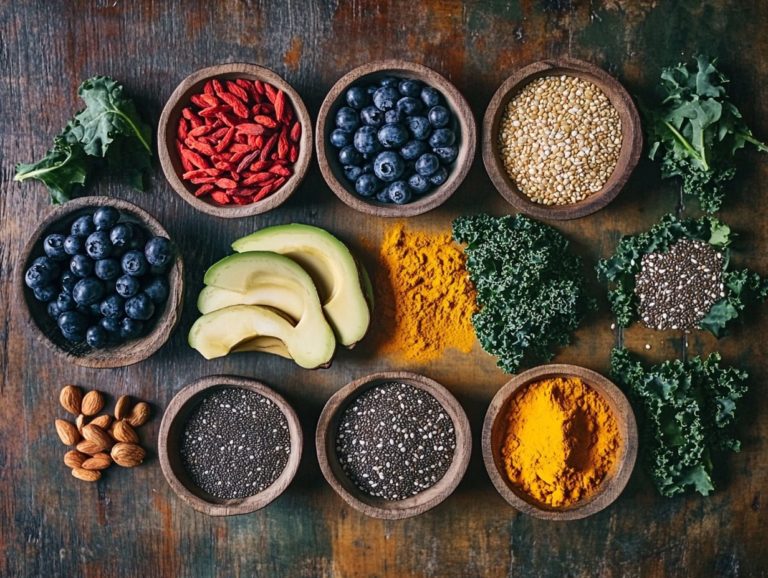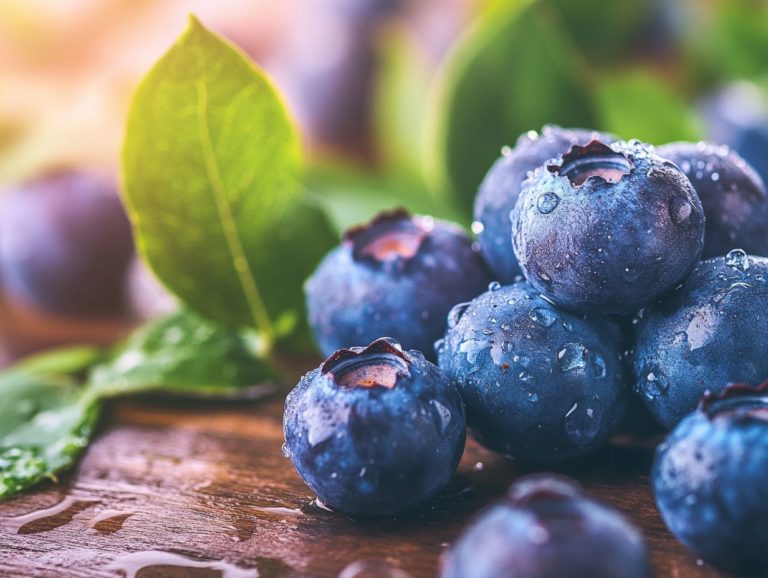The Science Behind Superfoods: What You Need to Know
Superfoods have taken the health world by storm. They offer a range of benefits, from boosting energy to enhancing overall wellness.
You’ll discover the nutritional benefits of superfoods, learn about different types, and find easy tips to add them to your meals.
While superfoods are appealing, it’s important to know about potential risks. Stay informed to make the best choices.
Dive in as we unveil the science behind superfoods and their promising future in the realm of nutrition.
Contents
Key Takeaways:
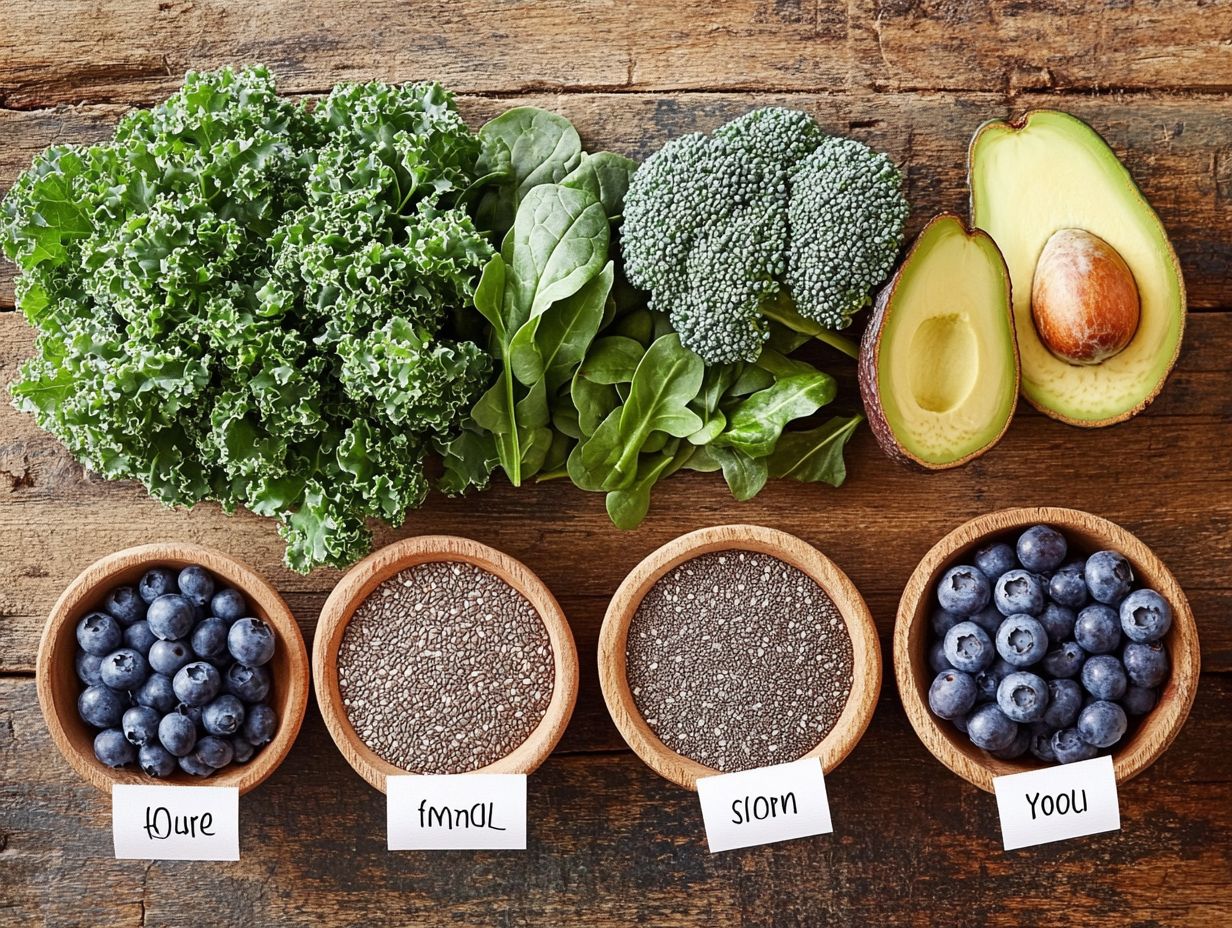
- Superfoods are foods rich in nutrients that can be easily added to a balanced diet.
- Incorporating a variety of superfoods into your diet provides essential nutrients linked to better health and disease prevention.
- While superfoods can be beneficial, it’s wise to be aware of potential risks and consult with a healthcare professional before making significant dietary changes.
What Are Superfoods?
Superfoods have emerged as a popular category of nutrient-rich foods, celebrated for their impressive health benefits and often deemed essential for a well-rounded diet. Whether you see media campaigns from the United Fruit Company or scroll through social media influencers discussing their marketing strategies, the excitement surrounding superfoods is clear.
These plant-based powerhouses are loaded with antioxidants, vitamins, and minerals, captivating health-conscious consumers.
Take blueberries, kale, quinoa, and chia seeds, for example; these foods exemplify the superfood category, offering a range of health-promoting properties that appeal to informed consumers and trendsetters alike.
As awareness around health and wellness continues to rise, brands are using strong marketing strategies to highlight the nutrient density of these foods.
In this landscape, superfoods not only diversify your diet but also cater to your modern cravings for foods that support overall well-being. By emphasizing their numerous health benefits, you can easily make delicious choices that fit your lifestyle.
Why Superfoods Matter
The nutritional benefits of superfoods are vast, as they are rich in antioxidants, vitamins, and minerals that support your health.
By adding these dietary staples to your routine, you may experience improvements in your wellness, including enhanced immune function and a reduced risk of chronic diseases.
How Nutrients in Superfoods Help You
Key nutrients found in superfoods, like omega-3 fatty acids in salmon or fiber in chia seeds, play a vital role in managing health conditions such as celiac disease and diabetes. Understanding how these nutrients impact your health allows you to make informed dietary choices.
Take turmeric, for instance. Its active compound, curcumin, has potent anti-inflammatory effects that may ease arthritis symptoms. Meanwhile, matcha green tea is loaded with antioxidants that can boost your energy levels and improve mental clarity perfect for that afternoon pick-me-up.
Incorporating these superfoods into your balanced diet not only promotes overall wellness but also helps prevent chronic conditions like cardiovascular disease, thanks to their heart-healthy properties. Recognizing the distinct advantages of each nutrient allows you to tailor your eating habits to better align with your health goals.
Types of Superfoods
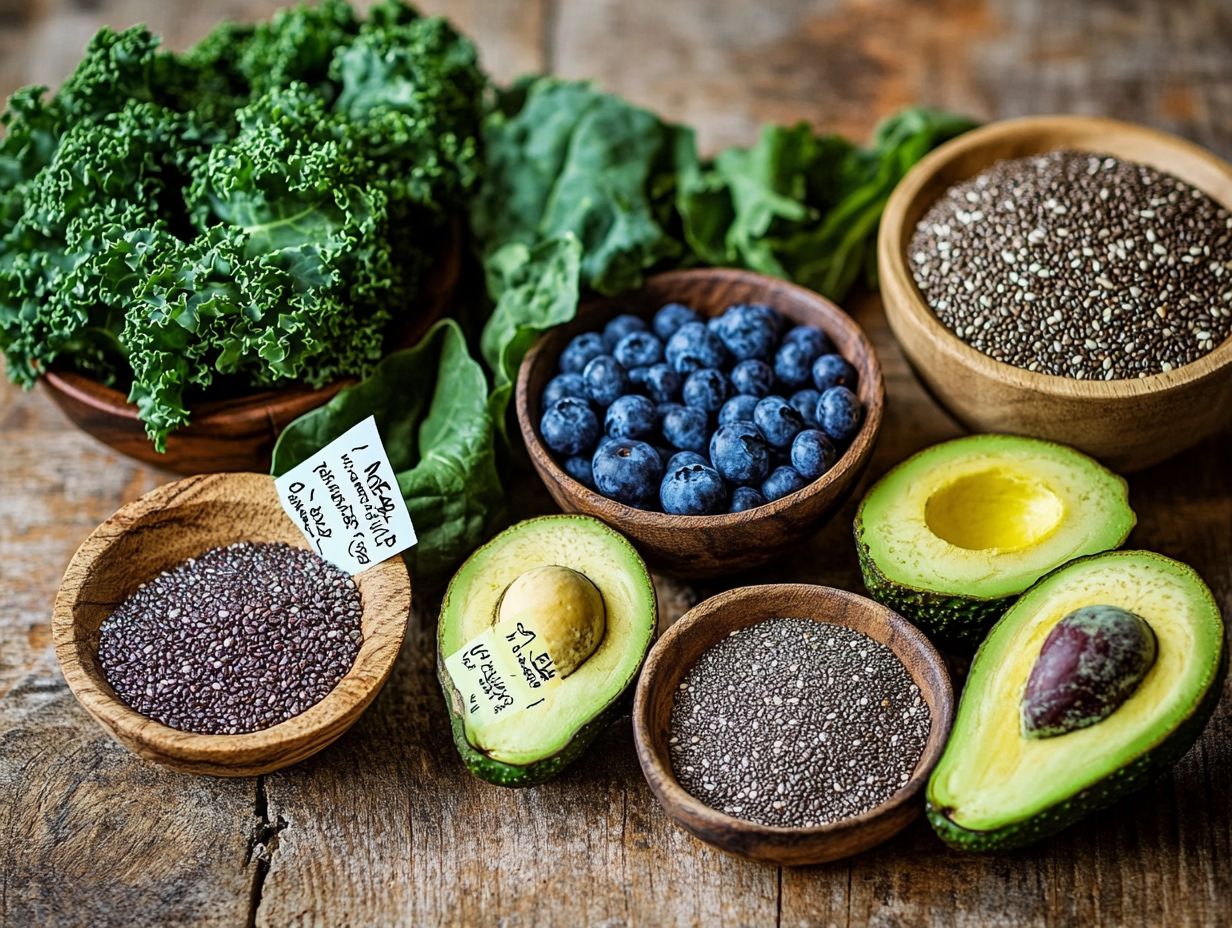
Superfoods can be categorized into various types, presenting a vibrant array of dietary options that cater to your diverse health needs and preferences.
Imagine nutrient-rich fruits like blueberries, hearty grains such as quinoa, and leafy greens like kale; each superfood category brings its own unique functional benefits to the table, enriching your wellness journey.
Different Categories and Examples
Different categories of superfoods include vibrant fruits like blueberries, versatile grains such as quinoa, and nutrient-dense vegetables like kale. Each offers a wealth of health benefits.
By incorporating superfoods like chia seeds, turmeric, and matcha into your daily meals, you can significantly enhance your nutritional intake.
These powerhouses can seamlessly blend into a balanced diet. For example, you can toss some blueberries, which are packed with antioxidants, into your smoothies or oatmeal for a refreshing morning boost.
Quinoa, a complete protein, makes an excellent base for salads and bowls, adding a hearty and nutritious touch. Kale, renowned for its high vitamin K content, can be effortlessly mixed into leafy green salads or saut ed to complement a variety of proteins.
You might also sprinkle chia seeds on yogurt or blend them into pudding. Turmeric s anti-inflammatory properties make it an exceptional seasoning for soups and rice dishes.
Embracing these superfoods not only diversifies your meals but also supports your overall well-being.
Incorporating Superfoods into Your Diet
Incorporating superfoods into your diet is key for maintaining a healthy diet that improves your overall well-being.
You can boost your intake of nutrient-dense foods by enjoying a superfood smoothie for breakfast or a kale salad for lunch, paving the way for a healthier lifestyle.
Tips for Adding Superfoods to Meals
To seamlessly incorporate superfoods into your meals, consider the art of meal planning and explore simple yet effective recipes that highlight these nutritional powerhouses.
For instance, blending blueberries into your morning smoothie or sprinkling chia seeds over yogurt can significantly elevate your nutrient intake.
For a more organized approach, designate specific days for different types of dishes in your weekly meal plan. This ensures you incorporate ingredients like quinoa, kale, or spirulina.
These versatile options shine in salads or grain bowls and can also enhance traditional recipes, transforming them into healthier versions.
Don’t miss out on the chance to transform your meals! Adding avocado to your sandwiches or pasta dishes brings delightful creaminess while delivering essential fats.
Snacking on edamame or crafting energy bites with oats and nut butter can help you fend off cravings, all while packing a nutritional punch that turns everyday meals into extraordinary feasts.
Potential Risks and Considerations
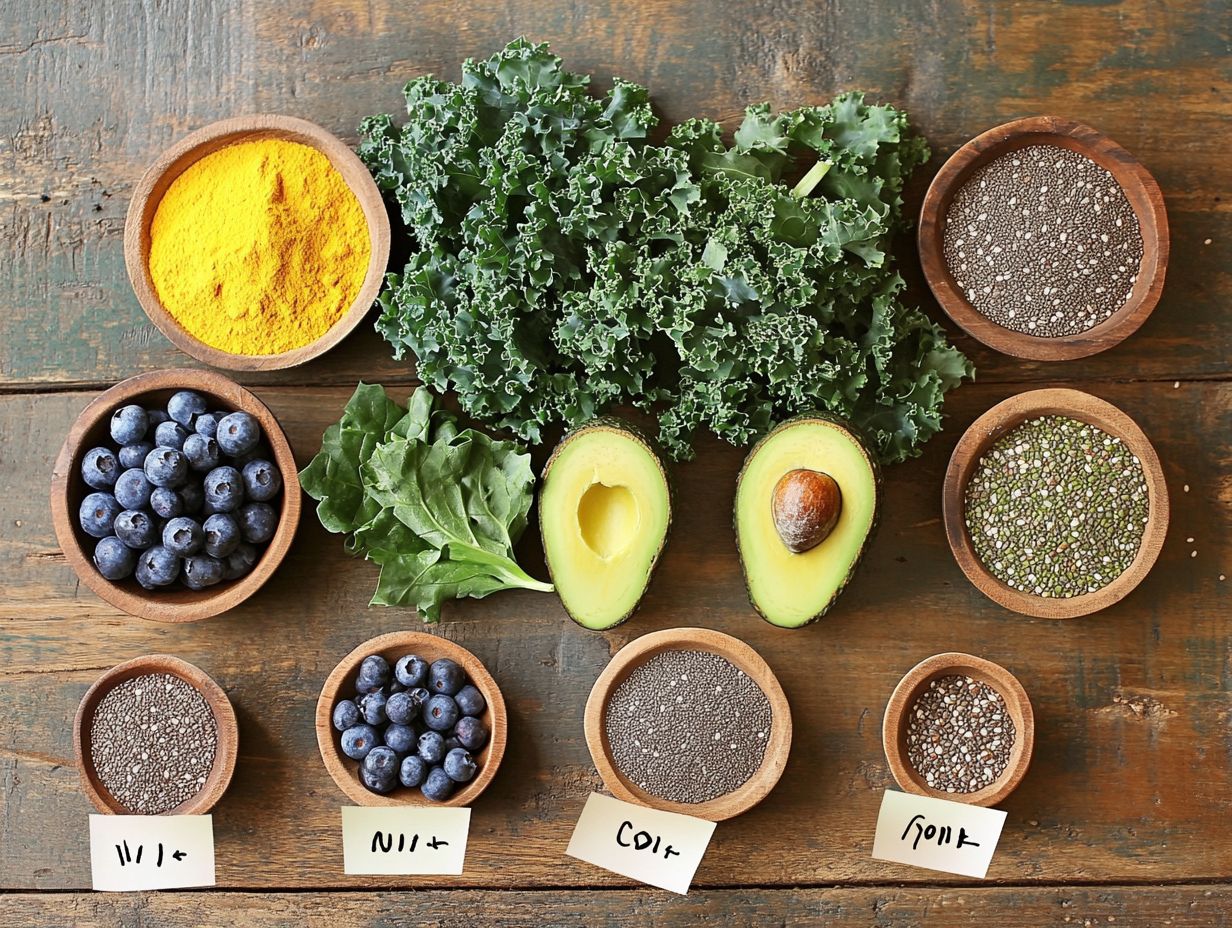
While superfoods are celebrated for their impressive health benefits, it’s essential not to overlook the potential risks and considerations. Some individuals may encounter side effects or allergic reactions to particular superfoods.
To truly reap the rewards, it s crucial to approach dietary variety with thoughtfulness and to be mindful of your personal health context.
Side Effects and Precautions
Some superfoods may come with side effects or allergic reactions, especially for individuals with conditions like celiac disease or specific dietary restrictions.
It s essential for you to understand these potential issues to safely incorporate superfoods into your diet.
Take quinoa, for example. While it s often lauded for its impressive protein content, it can sometimes trigger sensitivities in those who can’t eat gluten.
Similarly, spirulina a blue-green algae celebrated for its nutritional profile might cause adverse effects in certain individuals, particularly those with seafood allergies.
It’s crucial for you to monitor your reactions closely when introducing these foods into your meals. Keeping a food diary to track any symptoms and food intake can be incredibly helpful in pinpointing any troublesome ingredients.
Before diving into new superfoods, talk to a healthcare provider. Their advice can help you safely enjoy the benefits of these foods. Such professional guidance can undoubtedly make a significant difference in navigating the superfood landscape.
Future of Superfoods
The future of superfoods looks bright. Ongoing research reveals new health benefits and applications in functional foods.
With increasing interest in health claims, the superfood market will evolve significantly, adapting to preferences for enhanced wellness.
Research and Development in the Field
Research and development are vital in uncovering the nutritional content and health benefits of superfoods. Scientists are delving deeper into their effects on wellness and disease prevention.
This ongoing inquiry shapes your preferences as a consumer and drives innovation in the health and wellness sector.
As studies unveil the anti-inflammatory benefits of blueberries and the gut health advantages of fermented foods, you ll likely find these options irresistible, contributing to a noticeable surge in demand.
In response, marketers are fine-tuning their strategies to highlight these specific benefits, reshaping the product landscape. More brands are integrating superfoods into their offerings, catering to your growing desire for health-conscious choices.
This transformation influences everything from grocery store layouts to online shopping experiences, ultimately fostering a more informed and engaged market.
Frequently Asked Questions
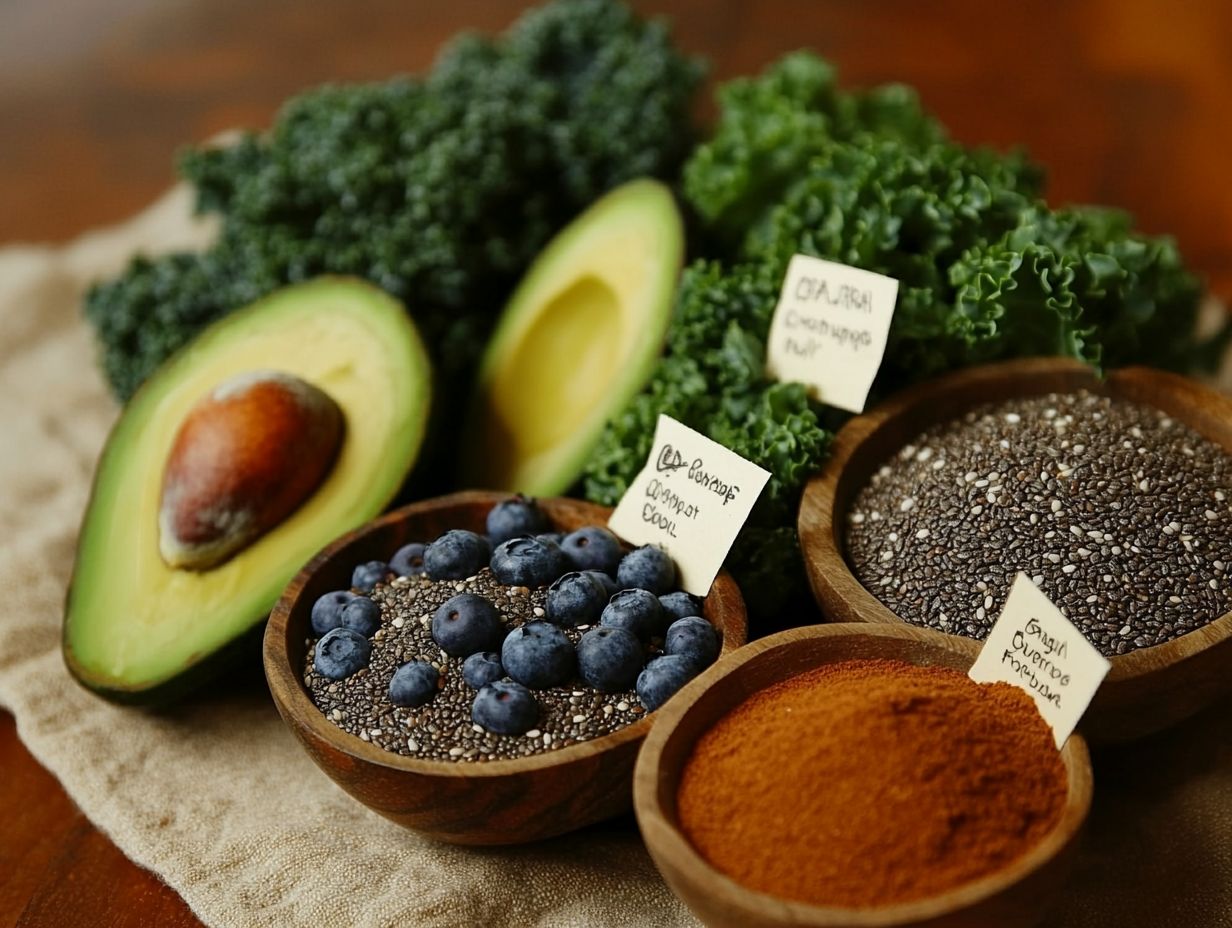
What are superfoods?
Superfoods are amazing nutrient-dense foods that pack a health punch. They are believed to provide numerous health benefits and are typically high in vitamins, minerals, antioxidants, and other beneficial compounds.
What is the science behind superfoods?
The science behind superfoods lies in their nutrient composition. These foods are packed with essential vitamins, minerals, and antioxidants that support overall health and well-being, as explained in detail about what makes a food a superfood.
Are superfoods a recent discovery?
No, superfoods have been around for centuries. Many of these foods have been used in traditional medicine and have been part of various cultures’ diets for a long time.
Do superfoods have to be exotic or expensive?
No, superfoods can be found in everyday foods like fruits, vegetables, nuts, and seeds. While some may be considered exotic or expensive, plenty of budget-friendly options are available.
Can superfoods cure diseases?
Superfoods are not a cure for diseases. However, incorporating them into a well-balanced diet may help prevent certain diseases and promote overall health.
Is there scientific evidence to support the benefits of superfoods?
Yes, numerous studies have been conducted on the health benefits of superfoods. However, more research is needed to fully understand their potential effects on the body.



